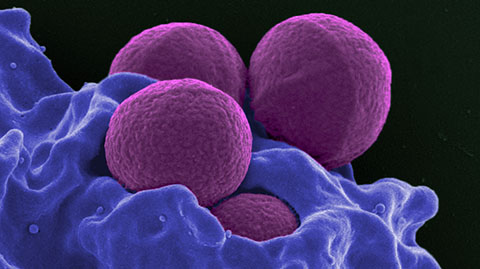
A client with a complex health history reveals he has recently been exposed to methicillin-resistant Staphylococcus aureus. During his session, his massage therapist finds lots of little scabs on his body—yikes! Good news: this is not nearly so scary as it seems. The hygienic practices we already use provide us with good protection from MRSA colonization, but that needs to happen on purpose, and not by accident. Also, you might want to keep some gloves and masks around.
Resources:
Centers for Disease Control and Prevention. “Healthcare Settings.” Last modified February 28, 2019. www.cdc.gov/mrsa/healthcare/index.html.
Gilboy, Joe. “Updated Information on MRSA Infections.” December 5, 2011. www.clinicaladvisor.com/home/features/updated-information-
on-mrsa-infections.
Madsen, A. M. et al. “Airborne MRSA and Total Staphylococcus aureus as Associated with Particles of Different Sizes on Pig Farms.” Annals of Work Exposures and Health 62, no. 8, p. 966–77. https://doi.org/10.1093/annweh/wxy065.
Nichols, Hannah. “All You Need to Know About MRSA.” January 27, 2020. www.medicalnewstoday.com/articles/10634.


This podcast sponsored by:
About Anatomy Trains:
Anatomy Trains is a global leader in online anatomy education and also provides in-classroom certification programs forstructuralintegration in the US, Canada, Australia, Europe, Japan, and China, as well as fresh-tissue cadaverdissectionlabs and weekend courses. The work of Anatomy Trains originated with founder Tom Myers, who mapped the human body into 13 myofascial meridians in his original book, currently in itsfourthedition and translated into 12 languages. The principles of Anatomy Trains are used by osteopaths,physicaltherapists,bodyworkers,massagetherapists,personaltrainers,yoga,Pilates,Gyrotonics,and other body-minded manual therapists and movement professionals. Anatomy Trains inspires these practitioners to work with holistic anatomy in treating system-wide patterns to provide improved client outcomes in terms of structure and function.
Website:anatomytrains.com
Email:info@anatomytrains.com
Facebook:facebook.com/AnatomyTrains
Instagram: instagram.com/anatomytrainsofficial
0:00:00.2 Speaker 1: Ruth Werner's best-selling book, A Massage Therapist's Guide To Pathology, is a highly regarded comprehensive resource that sets the standard for pathology education. Written for massage therapy students and practitioners, this groundbreaking resource serves up a comprehensive review of the pathophysiology, signs, symptoms, and treatment of more than 500 diseases and disorders. Learn more at booksofdiscovery.com.
0:00:32.3 Speaker 2: Anatomy Trains is excited to invite you to another exciting two-day dissection livestream specialty class, Deep Dive Into Joints, April 24th, and 25th. This advanced dissection livestream education experience is presented by Tom Myers and master dissector, Todd Garcia. In this two-day event, we will examine the blended nature of support for each of the joint areas. This special dissection livestream format allows us to explore more deeply, subjects and areas of interest. Visit anatomytrains.com for details.
[music]
0:01:13.2 Ruth Werner: Hi, and welcome to I Have A Client Who, pathology conversations with Ruth Werner, the podcast where I will discuss your real-life stories about clients with conditions that are perplexing or confusing. I'm Ruth Warner, author of A Massage Therapist's Guide to Pathology. And I have spent decades studying, writing about, and teaching about where massage therapy intersects with diseases and conditions that might limit our client's health. We almost always have something good to offer, even with our most challenged clients, but we need to figure out a way to do that safely, effectively and within our scope of practice. And sometimes, as we have all learned, that is harder than it looks.
0:02:00.7 RW: Today's, I Have A Client Who story, comes from a massage therapist who had quite a complex experience with her client, and her story goes like this. So I had my first client that disclosed he had MRSA a month ago, and he told me he was okay now. So many issues. I didn't have time to look them all up while I was there, and I don't have an app on my phone to do that either, so I ended up giving him a Swedish massage with no heat on the table, and I ended up wearing gloves, too. I massaged his neck lightly. He has several herniated discs, Lyme disease, knee replacement, etcetera. I don't think I've ever had someone with so many procedures done to them, with issues. Most of them were over a year ago, but still, wow. I was a little nervous, but ended up doing the massage. He actually didn't list a lot of the things because he couldn't write and he can't type, so I assisted him and as I was writing it for him, he then discussed things further and he kept remembering and adding to the list. So it was good that I talked with him because he was remembering things as we were talking. It's just a lot. I tried to keep up on contraindications, but then there's always something else that pops up.
0:03:12.0 RW: Oh, contributor, I have so many questions. And we could follow this down many pathways. We could talk about herniated discs or Lyme disease or knee replacements, or why, why, why could this client not write, and fill in his own intake form. That is a little boggling. But what we'll do today is talk about MRSA, and appropriate massage therapy accommodations for clients who tell us that they have or have had MRSA. And then we'll peek at some other things that this massage therapist learned about her client and the choices that she made on the spot. But before we dive into that, I do wanna point out one tiny little thing, which is that the contributor says she doesn't have a pathology app on her phone, and I'm happy to remind listeners that such a thing exists. I worked with ABMP to produce Pocket Pathology, which is a quick reference guide for massage, and it fits on your phone. Pocket Pathology is a free member benefit for all ABMP members and it does have an entry for MRSA, I checked. So I hope you are aware that MRSA stands for methicillin-resistant Staphylococcus aureus, and after a year of talking about almost nothing but viral infections with COVID, I'm kind of enjoying this break to talk about some bacteria for a change.
0:04:42.0 RW: Staph A is a strain of bacteria that like all Staph bacteria are spherical and they cling to each other in little bunches like grapes, but what makes MRSA peculiar among Staph A bacteria is that this subgroup is resistant to many common antibiotics. Now, I have a little tangent on antibiotics, so if you'll indulge me, let me remind you that antibiotics only came into widespread use in the early 1940s, and with them, we thought we had infectious diseases, tuberculosis was our main concern at that time, pretty much conquered, but by the late 1940s, we noticed that some antibiotics weren't working so well as they did at first. It only took a few years to see the beginnings of antibiotic resistance. By 1961, scientists had isolated Staphylococcus aureus, that was resistant to penicillin and some penicillin-like drugs, including amoxicillin and methicillin. At first, this was only happening in hospital settings and these drug-resistant infections would turn up as forms of pneumonia or post-surgical complications at wound sites, but before long, MRSA escaped the hospital settings and when it is found outside healthcare facilities, we now call it community-acquired MRSA. It's easy to assume that MRSA refers to just one type of bacteria, but that's technically incorrect.
0:06:10.3 RW: There are in fact, several subtypes of MRSA, and each of them are sensitive to some kinds of antibiotics and others are sensitive to others, and we don't have a reliable medical treatment for all of these infections. It's also possible to have MRSA in two different contexts. A person can be a carrier and not be sick, and this means they have colonies of this bacteria in their nasal sinuses and maybe on their skin, but these bacteria have created some kind of functioning working relationship with this person's protective mechanisms, and they're not ill. But they could share the bacteria with other people, say like, their massage therapist. And if any of those bacteria from a colonized person comes in contact with a skin lesion, like a hangnail or a blister or a microscopic cut from a razor, then that can create an infection that can become pretty serious. And that can happen for the colonized person and for anyone else that they contact. We usually think of MRSA as being transmitted through touch, and that touch can be skin-to-skin or skin to some other fomite like a razor or a towel, or some kind of personal item like a toothbrush, but there is also data that suggests MRSA can be airborne, and it's been found in air samples in many different settings, including in residences.
0:07:37.4 RW: And in this situation, it is conceivable that a person could inhale it and become colonized with the bacteria in their sinuses, and from there it can continue to spread, especially if that person coughs or sneezes, or if they touch their nose and then touch something else in the environment. That said, it seems clear that MRSA spreads much more readily through direct or indirect contact and not through the air. MRSA skin infections don't look any different from other bacterial infections. They look like boils. A typical presentation is a red pustule that's hot and painful and may seep fluid, and let me just do you a favor and suggest that you do not do a Google images search for MRSA infections. It does not respond to our most commonly used antibiotics. So if it's something other than a skin infection, like pneumonia or an infected joint or some situation that's most likely to be happening inside a hospital, if it's in that setting, it needs to be treated with high-level intravenous antibiotics that are not in the penicillin family. When it appears as a skin infection, it might be treated with local antibiotics, but some practitioners may recommend excising or lancing the lesion simply to reduce the possibility of further antibiotic resistance. The medical community is trying to be very conservative about the drugs we use to treat MRSA because we don't want it or any of its sub-strains to become resistant to any other classes of antibiotics.
0:09:11.6 RW: The guidelines for people who've been identified as MRSA carriers include basic personal hygiene measures, but on a scale that might be more diligent than we look for with most people. In other words, people who are MRSA carriers are advised to be extra careful about washing their hands when they prepare foods or when they come in contact with other people, maybe getting an extra shower right before they show up for their massage appointment, and to be really careful about disposing of used tissues, and they're supposed to shower thoroughly before using public pools and the like. I get questions about massage therapists being exposed to MRSA pretty regularly like, "What should I do when we have a client that has an undiagnosed boil-like lesion?" Or, "What if they tell us they've been exposed to MRSA," like today's contributor? There's also some concern about whether a person can continue to practice if they have been identified as a MRSA carrier. Nothing I have run across suggests that people who are MRSA carriers are barred or discouraged from participating in any particular working situation. In fact, I'd say that massage therapists are probably better suited than most to work safely with these extra cooty passengers just because we are generally so extremely conscientious about our own hygiene.
0:10:26.1 RW: So this is what our contributor had to say about the massage session and her client. She says, the client told me he caught it from his son who used his razor, although the client didn't know his son was using his razor at the time, and then he only found out about it afterwards. Apparently, it started in his ear in a tiny little spot, and then he said, it traveled to a few spots on his body. As I was massaging him with gloves, I noticed a few spots on his body that had scabs on it, and I thought maybe that's where the MRSA was, so I avoided going near those areas. And the client said his son had traveled to another country and contracted it then, and he didn't know until he got back home, and he didn't know his son was using his razor, and then he found out that his son had MRSA and he put two and two together. I was reading about MRSA and I found out it can be airborne as well so I'm glad I told him to leave his mask on and I was wearing a mask as well, So without a whole lot of information ahead of time, this massage therapist made some good choices. Gloves and masks are definitely appropriate for this setting, especially since it sounds like the client had multiple scabs which may or may not have had anything to do with MRSA. They could just as easily have been mosquito bites or other non-infected nicks and cuts, the kinds of things that everybody gets.
0:11:47.8 RW: But here's the thing. This is the reason we follow standard precautions and hygienic practices, and we have to assume that every client could have a contagious disease. This is why we wash our hands and change the laundry and create a working situation where nothing that one person touches is touched by another person until it is cleaned. If this therapist had not been wearing gloves, I expect she still would have avoided working over areas where her client's skin was damaged. If she had not been wearing a mask, it's not clear what her risk of exposure to MRSA might have been, but again, we see this bacterium spreads much more easily through direct contact, which is more easily managed. So if you have clients who you know have been colonized with MRSA, these are people you might wanna use extra precautions with like masks and gloves, and asking them to shower before they come to see you. But I wanna let you know that about one-third of the population carries some kind of Staph in their sinuses and 2% of the population carry MRSA in their nose, and most everybody doesn't know it. It is perfectly likely that you have already worked with some MRSA carriers, presumably without a negative outcome for you. So what do we do with this information? Well, here's the good news. We do what we've always done. We assume that every client may carry some pathogens and we maintain the highest standards of hygiene for their safety and for ours.
0:13:25.2 RW: Hey everybody, thanks for listening to I Have a Client Who, pathology conversations with Ruth Werner. Remember, you can send me your I Have a Client Who stories to ihaveaclientwho@abmp.com, that's ihaveaclientwho, all one word, all lowercase @abmp.com. I can't wait to see what you send me, and I'll see you next time.
0:13:53.0 S1: Members are loving ABMP Five-Minute Muscles and the ABMP Pocket Pathology, two quick reference web apps included with ABMP membership. ABMP Five-Minute Muscles delivers muscle-specific palpation and technique videos plus origins, insertions, and actions for the 83 muscles most commonly addressed by bodyworkers. ABMP Pocket Pathology created in conjunction with Ruth Werner, puts key information for nearly 200 common pathologies at your fingertips and provides the knowledge you need to help you make informed treatment decisions. Start learning today. ABMP members log in at abmp.com and look for the links in the featured benefits section of your Member home page. Not a member? Learn about these exciting member benefits at abmp.com/more.